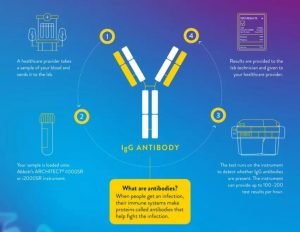The UK has placed antibody tests – which check if someone has had Covid-19 – at the centre of an eventual “back-to-work” plan to restart normal life.
But experts said they may not prove if someone is protected from reinfection.
The UK’s testing co-ordinator has also warned people not to buy private tests.
The government has already paid for three-and-a-half million antibody tests, but has not yet found one that is reliable enough to use – and stresses that it will not approve the use of any test until it can be sure its findings can be fully depended on.
Earlier, British Prime Minister Boris Johnson called them a ‘game changer’. Antibody tests have captured the world’s attention for their potential to help life return to normal by revealing who has been exposed, and might now be immune, to the new coronavirus.
Dozens of biotech companies and research laboratories have rushed to produce the blood tests. And governments around the world have bought millions of kits, in the hope that they could guide decisions on when to relax social-distancing measures and get people back to work. Some have even suggested that the tests could be used as an ‘immunity passport’, giving the owner clearance to interact with others again.
What are antibody tests?
In simple terms, antibody tests – also called serology tests – show who has been infected and recovered. The body makes antibodies in response to many illnesses, including COVID-19.
The tests searching for valuable IgG antibodies come in two main forms: rapid tests and assays.
The most simple rapid tests can be used at home, typically involving pricking a finger and they can get results in minutes.
Assays – which involve sending blood samples to a lab for analysis – are generally more accurate but take much longer. So governments ideally want good rapid tests.
How useful are the antibodies?
![]()

That is not yet fully understood. Whereas childhood infection by chicken pox can give long-lasting immunity, it is unclear how long COVID-19 resistance lasts.
And while most people who contract COVID-19 appear to produce antibodies, experts are unsure how long they remain and whether they have enough power to protect against future infections.
The hope is that COVID-19 antibodies will behave in a similar way to those the body makes against SARS, a disease that has a lot of similar genetic material. Immunity against SARS peaks at around four months and offers protection for roughly two to three years.








